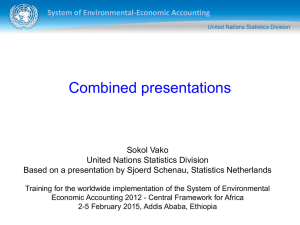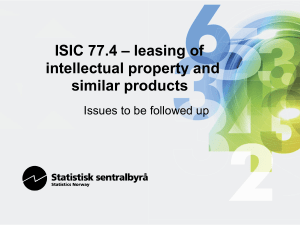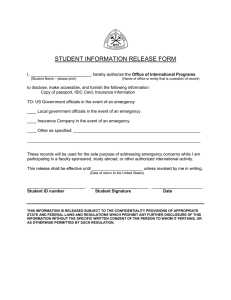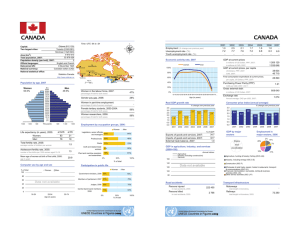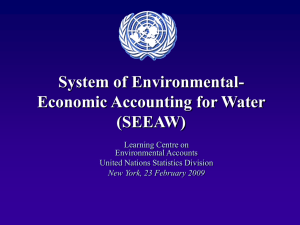Combined physical and monetary presentations Sjoerd Schenau
advertisement
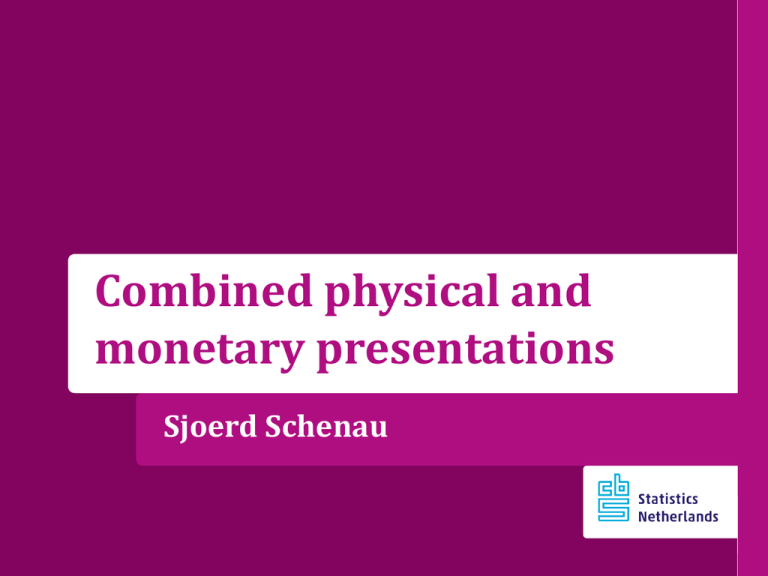
Combined physical and monetary presentations Sjoerd Schenau Content • • • • General introduction: integration within SEEA Core tables and acocunts Combined presentations for water Exercise 2 Integration within SEEA-CF Strength of SEEA: consistent application of accounting rules, principles and boundaries in organisation of physical and monetary information. 1. 2. 3. 4. Link between measures of flows of goods and services in physical and monetary terms as reflected in monetary and physical supply and use tables. Link between changes in the stock of environmental assets over an accounting period and the use of extracted natural resources as an input to economic production, consumption and accumulation. Connection between the measures of production, consumption and accumulation in monetary terms and measures of flows of income Integrating and presenting the accounts between different sectors. Functional accounts 3 Integration of supply and use tables in physical and monetary terms 4 Integration of asset accounts and supply and use tables 5 The sequence of economic accounts • SNA: sequence of economic accounts • Derivation of balancing items (GDP, GNI etc.) • Balancing items can be defined so as to take into account the depletion of natural resources Depletion adjusted net value added, depletion adjusted net operating surplus, etc 6 Adjusted National income for depletion 7 Possible structure for combined presentations 8 Questions ? 9 Exercise • Environmental accountants should not only compile the accounts, they should also be able to explain the data to the users. • Please assess the two core tables for water for 2005 and 2010. Evaluate the main changes that occurred between these two years. • Work in a group. Discuss the results. What are the 5 most important messages you deduce from this data? • Prepare a short presentation where you present the 5 most important messages and also explain why yiu think this is important. 10 1. Supply of water products (Currency units) Natural water Sewerage services 2. Total supply of products 3. Intermediate consumption and final use (Currency units) Natural water Sewerage services Other products 4. Gross value added (Currency units) 5. Employment (1000 fte) 6. Supply of water (Millions m3) Supply of water to other economic units Supply of waste water for treatment Total returns 7. Use of water (Millions m3) Total Abstraction Use of water received from other economic units Use of waste water for treatment 8. Water consumption (Millions m3) 9. Gross fixed capital formation (Currency units) For water supply For water sanitation 10. Closing Stocks of fixed assets for water supply (Currency units) 11. Closing Stocks of fixed assets for water sanitation (Currency units) 13 1 8 570 170 737 267 143 19 769 596 3 145 597 24 541 643 229 125 181 141 090 371 ISIC Total 38,39, 45- industry 99 1 2 8 570 14 7 8 605 5 022 5 022 5 036 6 478 288 6 949 543 58 1 12 683 7 027 13 2 360 6 197 40 1 029 2 366 1 1 406 1 653 1 718 5 842 990 6 130 529 3 277 632 863 814 995 4 3 2 211 61 41 27 64 88 29 4 400 381 9 47 208 39 115 45 404 4 465 156 42 4 28 582 16 819 2 872 43 8 204 10 931 417 48 1 381 176 958 10 3 411 7 2 51 5 2 874 6 112 84 9 871 25 347 17 37 457 1 204 141 411 242 Actual final consumption - 2 14 Total ISIC 36 ISIC 37 Government ISIC 1-3 ISIC 5-33, ISIC 35 41-43 Rest of the Taxes less subsidies on world products, trade and transport margins Households Industries (by ISIC categories) Capital Formation Water core table for 2005 8 604 5 038 6 174 3 316 605 817 60 66 50 096 8 604 5 038 814 995 10 931 236 5 11 240 10 4 289 2 874 41 431 37 457 381 411 963 1 215 381 411 252 4 289 2 874 41 431 37 457 11 1. Supply of water products (Currency units) Natural water Sewerage services 2. Total supply of products 3. Intermediate consumption and final use (Currency units) Natural water Sewerage services Other products 4. Gross value added (Currency units) In prices of year 2005 5. Employment (1000 fte) 6. Supply of water (Millions m3) Supply of water to other economic units Sup Total returns 7. Use of water (Millions m3) Total Abstraction Use of water received from other economic units Use 8. Water consumption (Millions m3) 9. Gross fixed capital formation (Currency units) For water supply For water sanitation 10. Closing Stocks of fixed assets for water supply (Currency units) 11. Closing Stocks of fixed assets for water sanitation (Currency units) 27 2 8 444 205 274 271 086 17 420 322 4 170 421 34 527 29 260 335 693 245 128 663 141 485 127 464 2 018 31 57 ISIC Total 38,39, 45- industry 99 1 5 8 444 16 7 8 496 4 939 4 939 4 955 7 237 420 7 744 598 75 1 11 781 5 563 4 598 59 12 2 302 6 131 5 677 45 42 1 222 2 354 1 1 506 1 769 2 062 6 418 280 6 733 507 2 850 816 412 1 006 968 2 639 722 488 892 126 49 8 673 11 179 3 4 112 23 3 360 350 49 47 211 23 144 53 362 5 465 146 62 4 19 723 28 612 3 742 452 9 3 449 8 51 1 3 54 5 1 837 7 182 78 9 287 28 465 15 22 285 350 246 940 1 194 138 449 245 5 105 1 837 45 027 22 285 Actual final consumption - 4 16 Total ISIC 36 ISIC 37 Government ISIC 1-3 ISIC 5-33, ISIC 35 41-43 Rest of the Taxes less subsidies on world products, trade and transport margins Households Industries (by ISIC categories) Capital Formation Water core table for 2010 8 493 4 960 6 074 3 116 655 817 62 71 61 096 8 493 4 960 1 006 968 11 179 350 449 945 203 5 5 212 1 199 350 449 254 9 12 5 105 1 837 45 027 22 285
